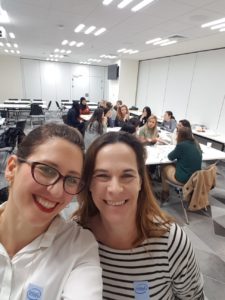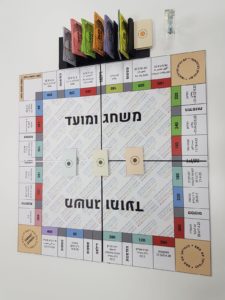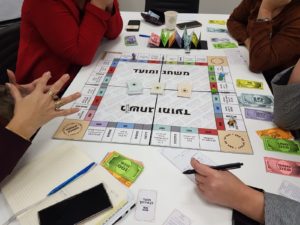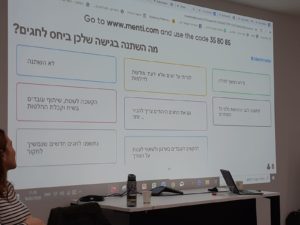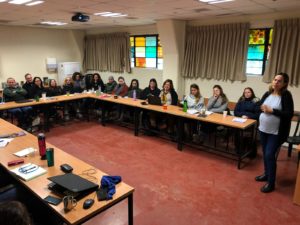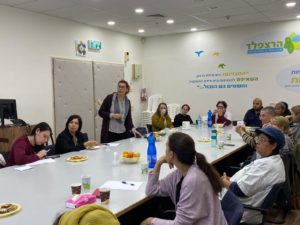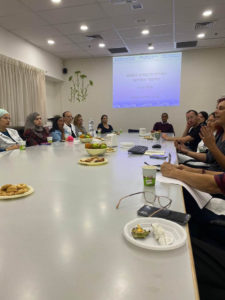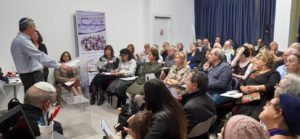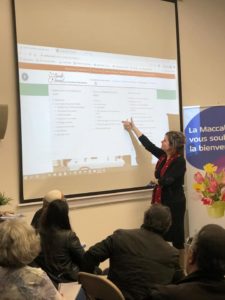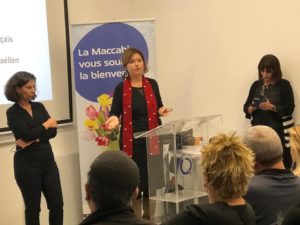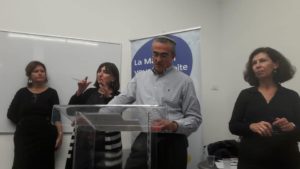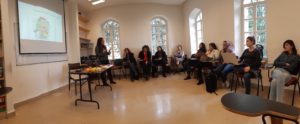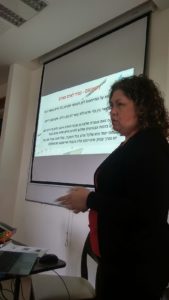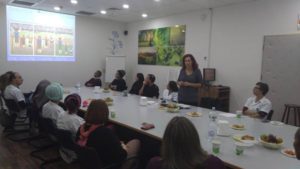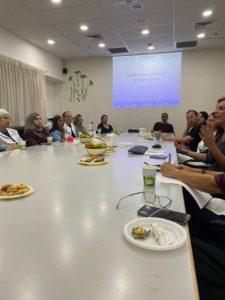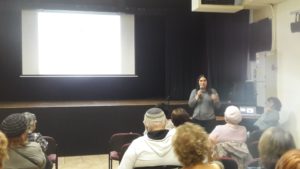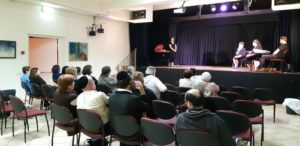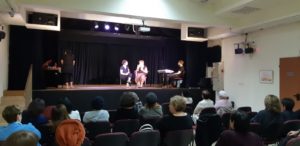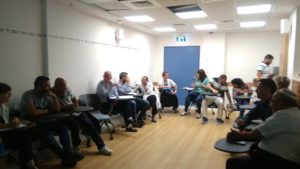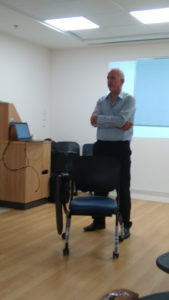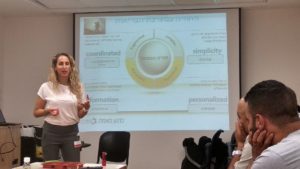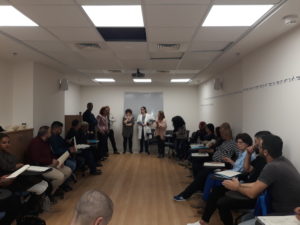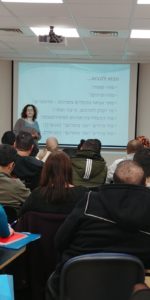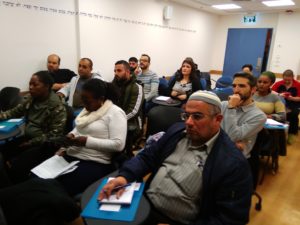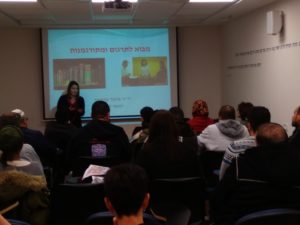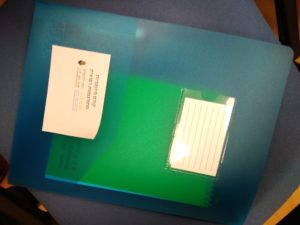HoliGame – Learning about Workforce Diversity through Play
Deep into the winter months, as the seasonal rains seem to never stop, it’s easy to forget that there are holidays just around the corner. How many holidays? About 20, many of which are concentrated in April-May, and which are celebrated and commemorated by most of the religions and communities living in Israel.
As a manager or employer, how do you prepare for the holidays? What should be taken into account when preparing for the holiday? How should it be marked? What happens when holidays from different religions fall on the same day? How do you make everyone feel like they belong, even when the holiday being celebrated is not theirs?
To learn about the ways to deal with all these complex issues, our Orna Shani Golan, Director of the Cultural Competency Desk, teamed up with Noa Tron, Director of the Israeli Forum for Employment Diveristy, and together they created HoliGame – a tool about how to prepare managers, employers and other staff to speak about the different holidays during April and May, as they prepare to mark the different holidays in their organizations and companies.
On 18.2, we were hosted by Intel’s Petach Tikva campus. A group of 25 women from different organizations came to play HoliGame for the first time: Getting to know the holidays, dealing with different dilemmas, challenges and opportunities that arise around the holidays, as well as issues, both regarding values and organizational logistics, that arise in when different holidays fall on the same day, the different ways workers react to each other, and more.
This is how the game works. In order for participants to advance on the game board, they had to deal with dilemmas such as:
- How to mark the Memorial Day for Fallen Soldiers without adding to existing tensions?
- How do you decide which holidays the organization celebrates, and which they don’t?
- What to do with a worker who actively works to sabotage an organization’s holiday commemoration?
- What to do when employees complain that they must give up their traditions in the name of inclusion and cultural sensitivity?
They also advanced if they picked a card that advances cultural competence, such as:
- As part of the preparation for the holiday period, you checked in advance who of the employees would like vacation and when.
- As a result of being prepared and organized early, both the needs of the staff and the needs of the system were taken care of.
- At a management meeting, it was decided that during Ramadan, all staff meetings at the company would end no later than 2pm so that the those who fast could have time to get home to the special meal that breaks their fast in the evening.
The participants were held up or had to ‘pay’ fines if they picked a card with an activity that is not culturally competent. For example:
- The foreman scheduled employees for shifts without taking into account that Easter and Passover fall at the same time, and as a result, you receive complaints about being inconsiderate about employees’ needs, and employees are unwilling to work during the holiday.
- Every May, a ceremony for the company’s Workers of the Year is held, with a rich array of refreshments. This year, Ramadan comes in May, so Muslim workers will not be able to take part in the ceremony.
- During the interim days of Passover week, a worker who does not keep Kosher dietary laws brought a pita into the common kitchenette, which led to an incident between him and those who do keep Kosher. Workers came to you to handle the issue, and it turned out that there were no previous instructions on what to do regarding food in the company during Passover.
Participants noted that they learned a great deal about both the holidays themselves and about tools to work out issues dealing with them in order to not create new tensions in the organization, and how to prepare ahead of time for the upcoming April and May holidays in particular and holidays in the organization in general.
Orna posted the following on Facebook:
Remember what it’s like when you had that dream? When you have some vague notion of what you want something to be, but the idea still doesn’t have a clear framework, a precise image in your mind, or even a name. Just a feeling. That’s the way it was with the HoliGame. A game that helps people become acquainted with the different holidays and commemorations in Israel, for those managing diverse teams. For the past several months, Noa Tron, Director of the Israeli Forum for Employment Diversity and I (from the Jerusalem Intercultural Center) have been passing ideas back and forth about how to make all the diverse holidays and commemorations in Israel accessible to everyone? What is the potential to create an inclusive environment with the right approach? And how many issues can be missed along the way? And not to mention the dilemmas that arise from just preparing for and commemorating the different holidays themselves. And finally, today, 25 women (where are you men?) had the opportunity to play this game, the HoliGame. A chance to get to know the holidays (Pentecost anyone?), deal situations, some more familiar, some less, and about think what each person can do to change things in each of the companies she came from.
So one small dream was fulfilled. (And thank you to amazing designer Sagi Ashin for understanding exactly what we dreamt about.) Thank goodness that there’s more where that came from. And if you want to hear more about HoliGame or want me to come to your company, speak with me (or Noa).
Here’s the original post:
The Israeli Forum for Employment Diversity also posted the following on Facebook:
It was a festive and interesting morning at Intel’s Petach Tikva campus. Months of developing and planning about how to prepare for the April-May holidays led us to the HoliGame. Becoming familiar with the holidays, dealing with dilemmas, challenges and opportunities that arise around the holidays, as well as issues regarding values and organizational logistics that arise when holidays fall on the same days, employee reactions, and more. Twenty-five women from different companies were able to deal with these questions in an experiential and unique way.
Some of our recommendations on how to make the corporate environment more culturally competent:
* Get to know the different holiday calendars and prepare for them ahead of time.
* Learn from mistakes and successes – create an organizational memory
* Adjust the company’s readiness to the needs of current employees
* Decide what to celebrate and commemorate – along with employees
* Holiday policies – take into account: food, ceremony, work scheduling (shifts, vacations, working hours), terminology, translation, appropriate gifts
* Creating an organizational ‘toolbox’ for responding to organizational tensions
* Using effective dialogue tools for dealing with employee resistance
* Holidays are not just welfare – they affect workers’ well-being on various levels.
Want to know more? Did you want to play and were not able to come? We also come to the companies themselves. Many thanks to the Jerusalem Intercultural Center and especially to Orna Shani on the wonderful partnership. A special thanks to Sagi Ashin for the stunning design. To the Be-Atzmi organization for the comments, and to Racheli Livni-Mordechai and to Hadar Tal Falik for their wonderful hospitality and the inspiration you gave us in telling Intel’s story.
And here’s the original post:

